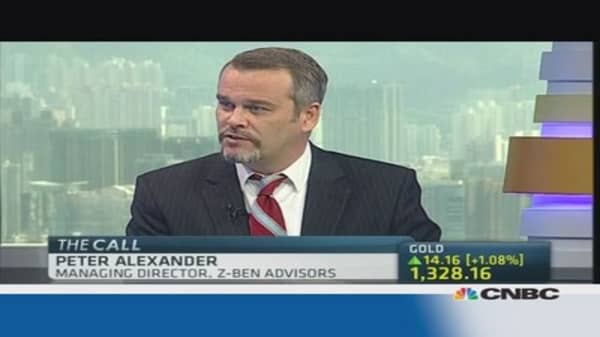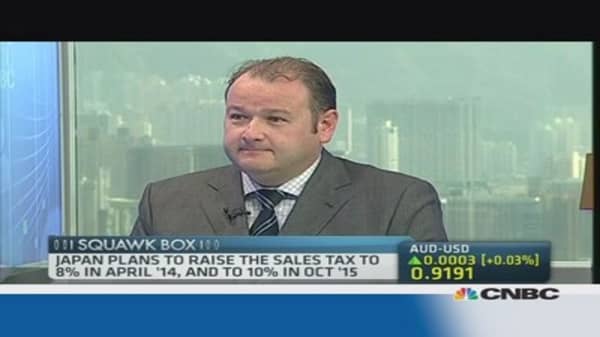"We're definitely going to see some [dollar-yen] depreciation here. It's an aspect of the fact that you're going to have some sentiment that is going to be harder for Abe to get through his increase in consumption tax," said Gavin Parry, managing director of Parry International Trading.
Manufacturers weighed on the index with camera make Nikon and Nintendo down 2.5 percent each, truck maker Isuzu Motors fell 3.4 percent and index heavyweights Softbank lost 4 percent .
(Read more: Here's the missing piece in Japan's growth puzzle)
Australia crosses 5,100
Australia's benchmark index closed at its highest level in a week thanks to positive economic sentiment in China and a rally in mining stocks.
Rio Tinto and BHP Billiton added over 2 percent each, Fortescue Metals increased 7.5 percent and Atlas Iron surged nearly 10 percent. The world's fifth-largest golf producer, Newcrest Mining, added 8 percent on the back of higher gold prices, despite posting it's first annual loss in eleven years.
Engineering firm UGL rose 1.6 percent despite reporting a 73 percent fall in annual profit while electronics retailer JB Hi-Fi rallied 3 percent after posting a better-than-expected 11 percent rise in full-year profits.
"The key debate that is going on among traders and investors alike is whether the RBA [Reserve Bank of Australia] has finished its easing cycle. We would put the probability of a November cut at 50:50, but a lot is now fully dependant on the upcoming employment reports and more importantly, the October CPI print," said Chris Weston, market strategist at IG in a note.
Kospi 0.2% higher
South Korea's benchmark index approached the key 1,900 level as industrial stocks got a lift from the stronger Japanese currency, which gives them a competition advantage in overseas markets.
Automakers SSangyong Motor rallied 8 percent, Kia Motors and Hyundai Mobis added nearly 1 percent each while shipbuilder Posco rose 1.3 percent.
Samsung Electronics inched up 0.2 percent after the U.S. International Trade Commission (ITC) decided to ban the import and sale of some of its products in the U.S. on Friday.
Carrier Asiana Airlines lost 2 percent after it reported a deeper-than-expected operating loss on Friday, stating that North Korean tensions hurt travel demand.
— By CNBC.com's Nyshka Chandran. Follow her on Twitter @NyshkaCNBC




